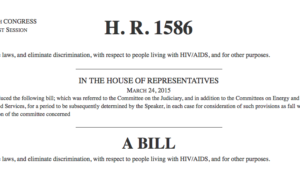Overview
Alabama does not have any HIV-specific laws, however there are general disease laws which can be used to prosecute people living with HIV for perceived ‘exposure’. General criminal laws have also been used.
Under the Criminal Code there is a general criminal offence of ‘assault with bodily fluids’ which prohibits knowingly causing, or attempting to cause, another to come into contact with bodily fluids, which includes blood, saliva, seminal fluid, mucous, urine, or faeces. There is a defence to this provision where the contact was consensual or medically necessary. This offence was introduced following a 2016 incident in which a man was arrested after allegedly throwing semen at a woman.
The provision is ordinarily a class A misdemeanour punishable with imprisonment for up to three months, but where committed by a person living with a communicable disease it is enhanced to a class C felony with up to ten years’ imprisonment and/or a fine. Although the diseases included are not defined, case law shows that the provision applies to HIV. Neither intent nor transmission of the disease are required in order for the sentence enhancement to be triggered. This provision enables heavy prison sentences for contact with bodily fluids which are not known to be an HIV exposure or transmission risk.
There is also an offence under the Health Code which criminalises people living with sexually transmitted infections (STIs) who knowingly transmit, ‘assume the risk of transmitting’, or do any act which will ‘likely transmit such disease to another’. There is no requirement for intent, and although transmission forms part of the offence, only a ‘risk’ of transmission is required. This is a class C misdemeanour punishable with up to three months’ imprisonment and/or a fine. The STIs covered by this offence are not listed but presumably would include HIV; however we are not aware of any HIV cases under this provision.
People living with HIV have also been charged with general criminal offences for perceived HIV ‘exposure’. In a 1989 case, an imprisoned man living with HIV was convicted of first-degree assault in the first instance after he bit a police officer. The prosecution based their arguments on the defendant’s mouth being a ‘deadly weapon or dangerous instrument’, which is required for assault to be charged in the first degree. His conviction was reduced to third-degree assault on appeal, as the prosecution failed to prove that his mouth was a deadly weapon or that he intended to cause serious harm. Although this was early in the HIV epidemic, the appeal decision represented a good understanding of known HIV transmission risks, including the fact that saliva is not a route of transmission. This suggests that acts such as biting or spitting could not be prosecuted under this provision, but does not eliminate the possibility of prosecution for acts that carry some risk of transmission.
There are a number of other health laws regulating the treatment of communicable diseases which may impact people living with HIV. These laws allow compulsory testing, examination, treatment, and commitment for people living with STIs, as well as quarantine and isolation for people living with conditions designated as a threat to public health. Those living with designated conditions are required to obey instructions by health officials. People charged with certain sexual offences are also required to be tested for STIs and results can be shared with complainants, but cannot be used in prosecutions, Finally, health records can be released upon court order to aid HIV-related prosecutions where HIV is alleged to have been transmitted.
Aside from the 1989 case outlined above, we are aware of two more HIV criminalisation cases in Alabama. In 2018 there were two cases under the felony assault with bodily fluids offence, both of which involved perceived ‘exposure’ by bodily fluids which are known not to be able to transmit HIV. The first concerned a man living with HIV who allegedly sprayed faeces on a police officer. In the second, a man living with HIV allegedly spat on a nurse. A more recent case in 2020 saw a man living with HIV and hepatitis C charged for third-degree assault for allegedly biting a shop security officer, however no charges appear to have been laid for a possible ‘exposure’ offence.
Prior to 2012, people living with HIV who were imprisoned for offences, whether HIV-related or otherwise, were segregated from the general prison population and were forced to wear white armbands as identification. This policy was challenged and found to be illegal discrimination by the courts in December 2012.
The only change to Alabama’s disease laws in recent years has been the 2017 addition of the assault with bodily fluids provision. In 2015 there was an unsuccessful attempt to increase the punishment for the communicable disease ‘exposure’ offence. Democrat Representative Juandalynn Givan introduced House Bill 50, which would have increased the penalty to class C felony, raising the maximum prison sentence from three months to ten years. This was actively opposed by local advocacy groups, such as AIDS Alabama, as well as national organisations, such as the Positive Justice Project, who highlighted likely adverse impacts on public health. The bill eventually died in committee stage.
For a detailed analysis of HIV criminalisation in Alabama, as well as all other US states, see the Center for HIV Law and Policy report, HIV Criminalisation in the United States: a Sourcebook on State and Federal HIV Criminal Law and Practice.
Laws
Alabama Code § 13A-6-242
Assault with bodily fluids
(a) A person commits the crime of assault with bodily fluids if he or she knowingly causes or attempts to cause another person to come into contact with a bodily fluid unless the other person consented to the contact or the contact was necessary to provide medical care.
(b) For purposes of this section, a bodily fluid is blood, saliva, seminal fluid, mucous fluid, urine, or feces.
(c) Assault with bodily fluids is a Class A misdemeanor; provided, however, a violation of this section is a Class C felony if the person commits the crime of assault with bodily fluids knowing that he or she has a communicable disease.
Alabama Code § 22-11A-21
Penalty for person afflicted with sexually transmitted disease to transmit such disease to another person
(…)
(c) Any person afflicted with a sexually transmitted disease who shall knowingly transmit, or assume the risk of transmitting, or do any act which will probably or likely transmit such disease to another person shall be guilty of a Class C misdemeanor.
Further resources
Not all laws used to prosecute people living with HIV in this state are included on this page. For a comprehensive overview and analysis of HIV-related criminal and similar laws and policies, visit The Center for HIV Law and Policy.







